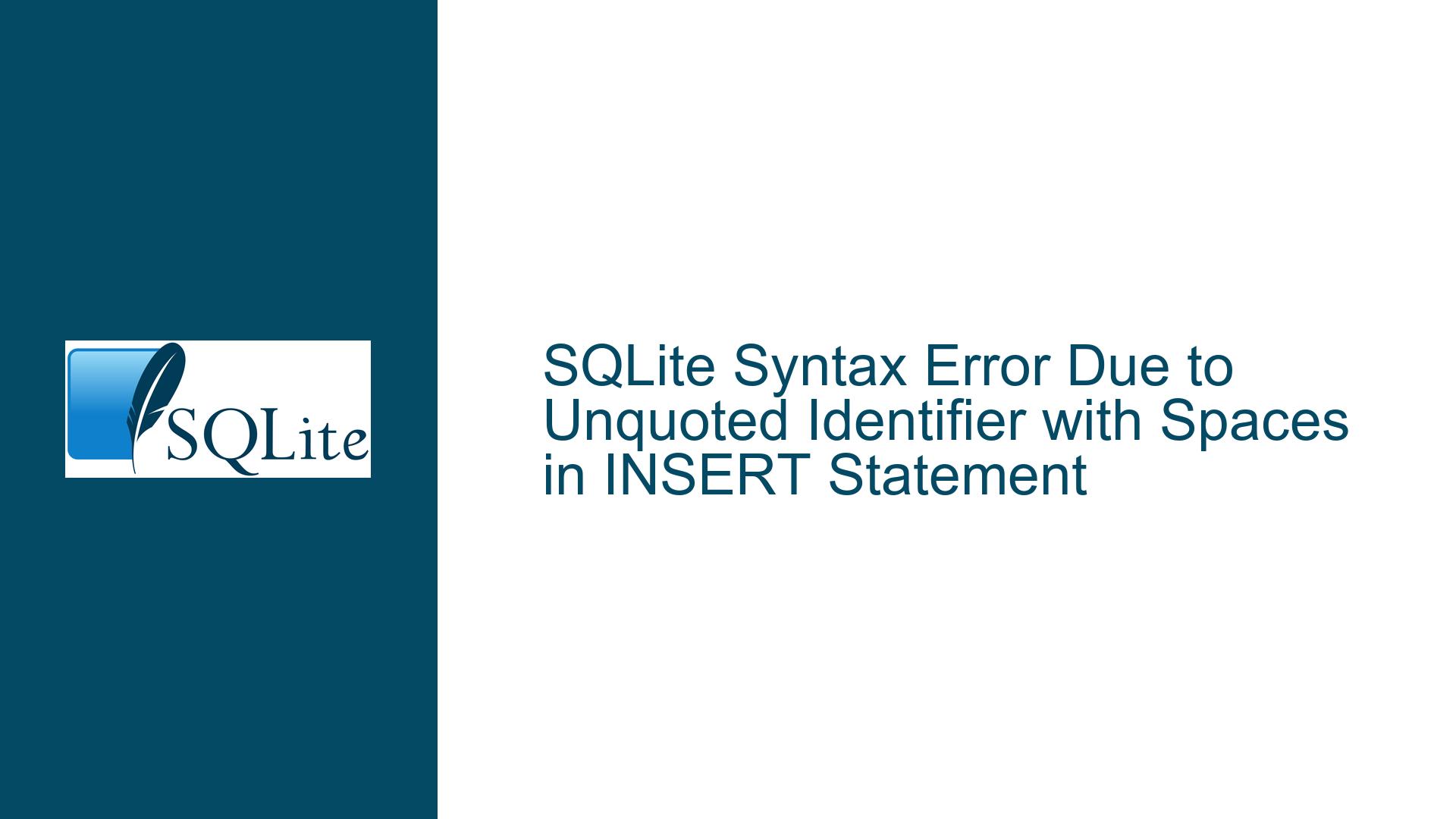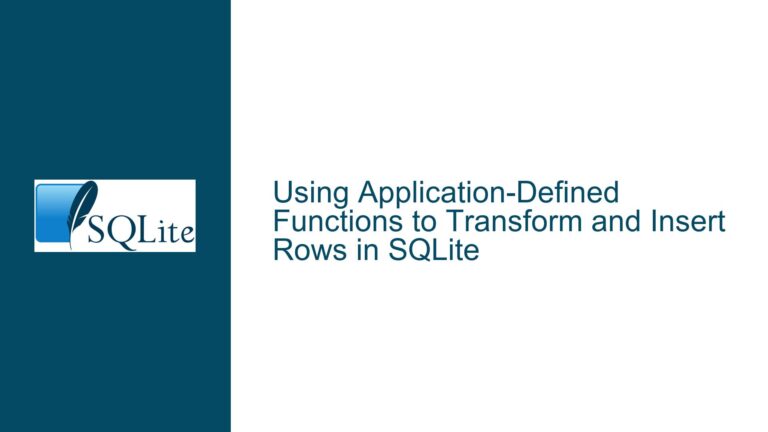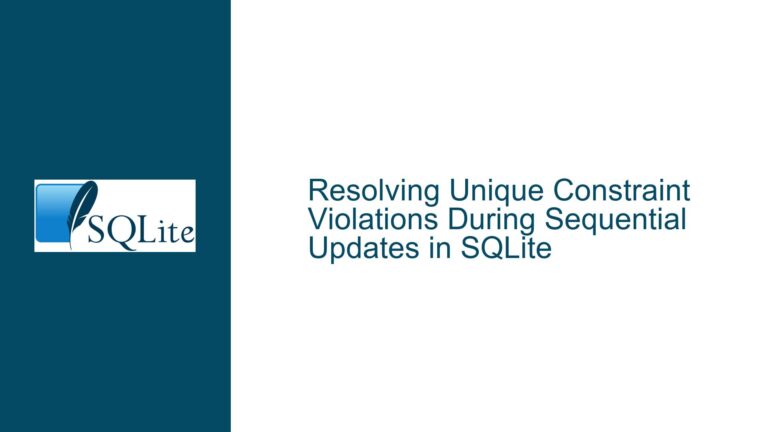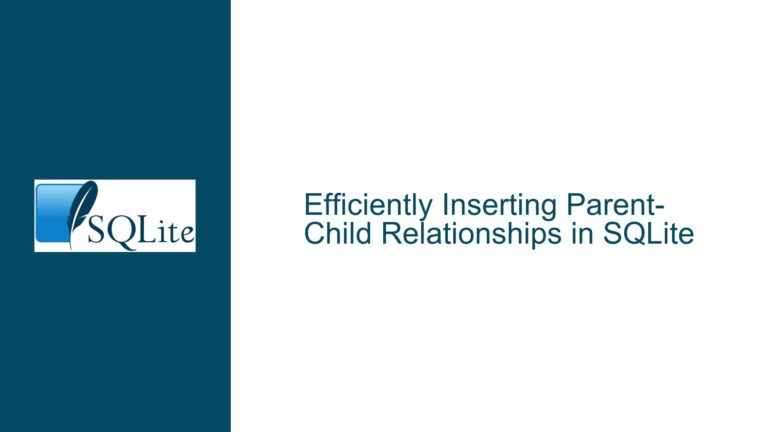SQLite Syntax Error Due to Unquoted Identifier with Spaces in INSERT Statement
SQLite INSERT Statement Failing with "near ‘Type’: syntax error"
The core issue revolves around an SQLite INSERT statement that fails with the error message: near "Type": syntax error. This error occurs when attempting to insert data into a table where one of the column names contains a space and is not properly quoted. The table schema includes a column named "Log Type", which is a foreign key referencing another table. The INSERT statement in question does not correctly handle the column name with a space, leading to a syntax error.
The schema for the PROJECT table is as follows:
CREATE TABLE PROJECT (
"pro_id" INTEGER NOT NULL DEFAULT 1,
"app_id" INTEGER NOT NULL DEFAULT 3,
"Start" TEXT NOT NULL,
"End" TEXT NOT NULL,
"Output" INTEGER NOT NULL,
"Log Type" INTEGER NOT NULL,
"Errors" INTEGER NOT NULL,
"Success" INTEGER NOT NULL,
"NOTES" VARCHAR NOT NULL DEFAULT '',
"Duration" TEXT NOT NULL DEFAULT '00.00.00.000',
PRIMARY KEY("app_ID", "pro_ID", "Start"),
FOREIGN KEY ("Output") REFERENCES "OUTPUTS" ("ID") ,
FOREIGN KEY ("app_ID", "pro_ID") REFERENCES "PROJECTS"("A_ID", "P_ID"),
FOREIGN KEY ("Log Type") REFERENCES "TYPE" ("ID")
);
The problematic INSERT statement is:
temp = "INSERT INTO PROJECT (pro_id, app_ID, Start, End, Output, Log Type, Errors, Success, NOTES, Duration)
VALUES(1,1, Date & time in quotes, Date & time in quotes, '1, 1, 0, 0, '0.0.0.0.000')";
The error arises because the column name "Log Type" contains a space and is not enclosed in double quotes within the INSERT statement. SQLite interprets Log Type as two separate identifiers, leading to a syntax error.
Unquoted Identifiers with Spaces and Foreign Key Constraints
The primary cause of the issue is the use of an unquoted identifier with a space in the INSERT statement. SQLite, like many other SQL databases, requires identifiers with spaces or special characters to be enclosed in double quotes. When the column name "Log Type" is not quoted, SQLite cannot parse the statement correctly, resulting in a syntax error.
Additionally, the presence of foreign key constraints in the schema complicates the issue. The "Log Type" column is a foreign key referencing the "TYPE" table. If the INSERT statement does not correctly reference this column, it could lead to foreign key constraint violations, further complicating the debugging process.
The use of spaces in identifiers is generally discouraged in SQL databases due to the potential for syntax errors and reduced readability. However, if such identifiers are used, they must be consistently quoted in all SQL statements to avoid errors.
Properly Quoting Identifiers and Ensuring Foreign Key Integrity
To resolve the issue, the INSERT statement must be modified to correctly quote the "Log Type" column. The corrected statement should look like this:
temp = "INSERT INTO PROJECT (pro_id, app_ID, Start, End, Output, \"Log Type\", Errors, Success, NOTES, Duration)
VALUES(1,1, Date & time in quotes, Date & time in quotes, '1, 1, 0, 0, '0.0.0.0.000')";
In this corrected statement, the "Log Type" column is enclosed in double quotes, ensuring that SQLite interprets it as a single identifier. This resolves the syntax error and allows the INSERT statement to execute successfully.
Escaping Double Quotes in Programming Environments
When embedding SQL statements in programming languages like C++ or Qt, it is essential to escape double quotes properly. In C++ and similar languages, double quotes within a string literal must be preceded by a backslash (\). Therefore, the corrected INSERT statement in a Qt environment would look like this:
temp = "INSERT INTO PROJECT (pro_id, app_ID, Start, End, Output, \"Log Type\", Errors, Success, NOTES, Duration)
VALUES(1,1, Date & time in quotes, Date & time in quotes, '1, 1, 0, 0, '0.0.0.0.000')";
This ensures that the double quotes around "Log Type" are correctly interpreted by both the programming language and SQLite.
Best Practices for Identifiers in SQLite
To avoid similar issues in the future, it is recommended to follow these best practices when working with SQLite:
Avoid Spaces in Identifiers: Use underscores (
_) or camelCase for multi-word identifiers instead of spaces. For example, useLog_TypeorLogTypeinstead of"Log Type".Consistent Quoting: If you must use identifiers with spaces or special characters, ensure they are consistently quoted in all SQL statements. This includes
CREATE TABLE,INSERT,SELECT,UPDATE, andDELETEstatements.Foreign Key Constraints: When defining foreign key constraints, ensure that the referenced columns are correctly quoted and that the data types match between the referencing and referenced columns.
Testing and Validation: Always test SQL statements in a controlled environment before deploying them to production. Use tools like SQLite’s command-line interface or a database management tool to validate your queries.
Documentation and Code Reviews: Document your schema design decisions and conduct code reviews to catch potential issues early. This is especially important when working in teams or on large projects.
Example of a Corrected Schema and INSERT Statement
To illustrate the best practices, here is an example of a corrected schema and INSERT statement:
Schema:
CREATE TABLE PROJECT (
pro_id INTEGER NOT NULL DEFAULT 1,
app_id INTEGER NOT NULL DEFAULT 3,
Start TEXT NOT NULL,
End TEXT NOT NULL,
Output INTEGER NOT NULL,
Log_Type INTEGER NOT NULL,
Errors INTEGER NOT NULL,
Success INTEGER NOT NULL,
NOTES VARCHAR NOT NULL DEFAULT '',
Duration TEXT NOT NULL DEFAULT '00.00.00.000',
PRIMARY KEY(app_ID, pro_ID, Start),
FOREIGN KEY (Output) REFERENCES OUTPUTS (ID),
FOREIGN KEY (app_ID, pro_ID) REFERENCES PROJECTS(A_ID, P_ID),
FOREIGN KEY (Log_Type) REFERENCES TYPE (ID)
);
INSERT Statement:
temp = "INSERT INTO PROJECT (pro_id, app_ID, Start, End, Output, Log_Type, Errors, Success, NOTES, Duration)
VALUES(1,1, Date & time in quotes, Date & time in quotes, '1, 1, 0, 0, '0.0.0.0.000')";
In this example, the Log_Type column is defined without spaces, eliminating the need for double quotes in the INSERT statement. This approach improves readability and reduces the risk of syntax errors.
Conclusion
The syntax error in the INSERT statement is caused by the unquoted identifier "Log Type" containing a space. By properly quoting the identifier and following best practices for SQLite schema design, the issue can be resolved. Additionally, escaping double quotes in programming environments like Qt ensures that the SQL statements are correctly interpreted. Adopting these practices will help prevent similar issues in the future and improve the overall robustness of your SQLite database applications.






